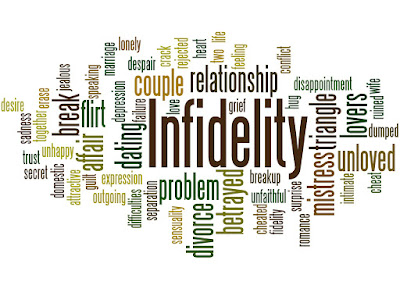
I want to relate a story that a good friend shared with me in the midst of a conflict she was having. I have her permission to share. My good friend showed up at church one Sunday surprised to see that an old male friend of hers had not only just moved into her ward, but had moved five doors down from her, on the same street as her. It wasn't long before their kids were carpooling to school, the families were hanging out for dinners and games, and it was very easy to pick the friendship right back up where they left off. The only problem was they were no longer young single adults, but married with families. The friendship that felt natural was no longer appropriate. They would text each other on occasion about kids or school stuff and then continue talking about other things. He would complain about his wife and she would give him advise thinking she was helping. One night when her husband was working late, she heard a noise in her backyard and asked him to check around the house. He mentioned to her a few days later that he was nervous going over because he thought that perhaps she had something more in mind than that excuse. She was shocked and appalled that he would have assumed that. She had no idea that he had been considering their friendship as something more than it was. She didn't know what to do and had asked me for advise. She wound up ending contact with him, instead, choosing to communicate with his wife for kid and school related things, setting up dinners and games with the wife, and only speaking to her old friend in a group setting. She felt uncomfortable and guilty that she had so closely toed the line of emotional infidelity.
She was lucky that she had caught herself early in the stages of unfaithfulness. Like any cancer or fatal disease, infidelity can have stages. Goddard goes in order of the stages in his book Drawing Heaven into Your Marriage;
- Behaviors that seem innocent
- An affection grows and claims part of ones heart
- Extramarital flirting (Justified)
- Relationship is declared as special
- Opportunities are found to see friend (also there is worry of what others would say or think)
- Excuses made for the time and resources spent on other person
- Spouse is displaced and emotional intimacy is given to friend
- Faultfinding with spouse
- Fantasies about other person
- Physical affection given to other person
- Sexual relationship
Now, if you have found yourself anywhere in the stages of unfaithfulness, you can repent at any time and escape that tricky web. The sooner the better! You cannot violate your covenants made to your spouse and find lasting joy or happiness. "Wickedness never was happiness." Instead, follow the stages of repentance and prevention that Goddard lists!
- Do not plant seeds of lust by imagining fantasies, or watching inappropriate media
- No excuse to spent time with the other person. Guard your emotional intimacy well.
- Be responsible for the messages you send. No accidental or intentional flirting.
- Don't dwell on anyone in your heart. Pray for them but do not daydream of them.
- Get help from a bishop or counselor if you find yourself addicted.
- Spend more time with your spouse.
- Renew your spiritual efforts and ask the Lord for strength.
- Avoid temptation, make your spouse a partner in your efforts.
- Stay away from pornography.
- Celebrate the gift of your spouse and their trust. Appreciate them!
Perhaps you've read this post feeling guilty and wanting to make changed, and perhaps you've read the post, proud of your commitment to honor your covenants. To both types of reader, I offer this hope, and this promise delivered by Goddard...
"Those who resist the lure and guile of Satan, those who honor covenants, those who tend the little garden of their own covenants, will enjoy sweetness in this life and rewards unmeasured in the world to come."






Comments
Post a Comment